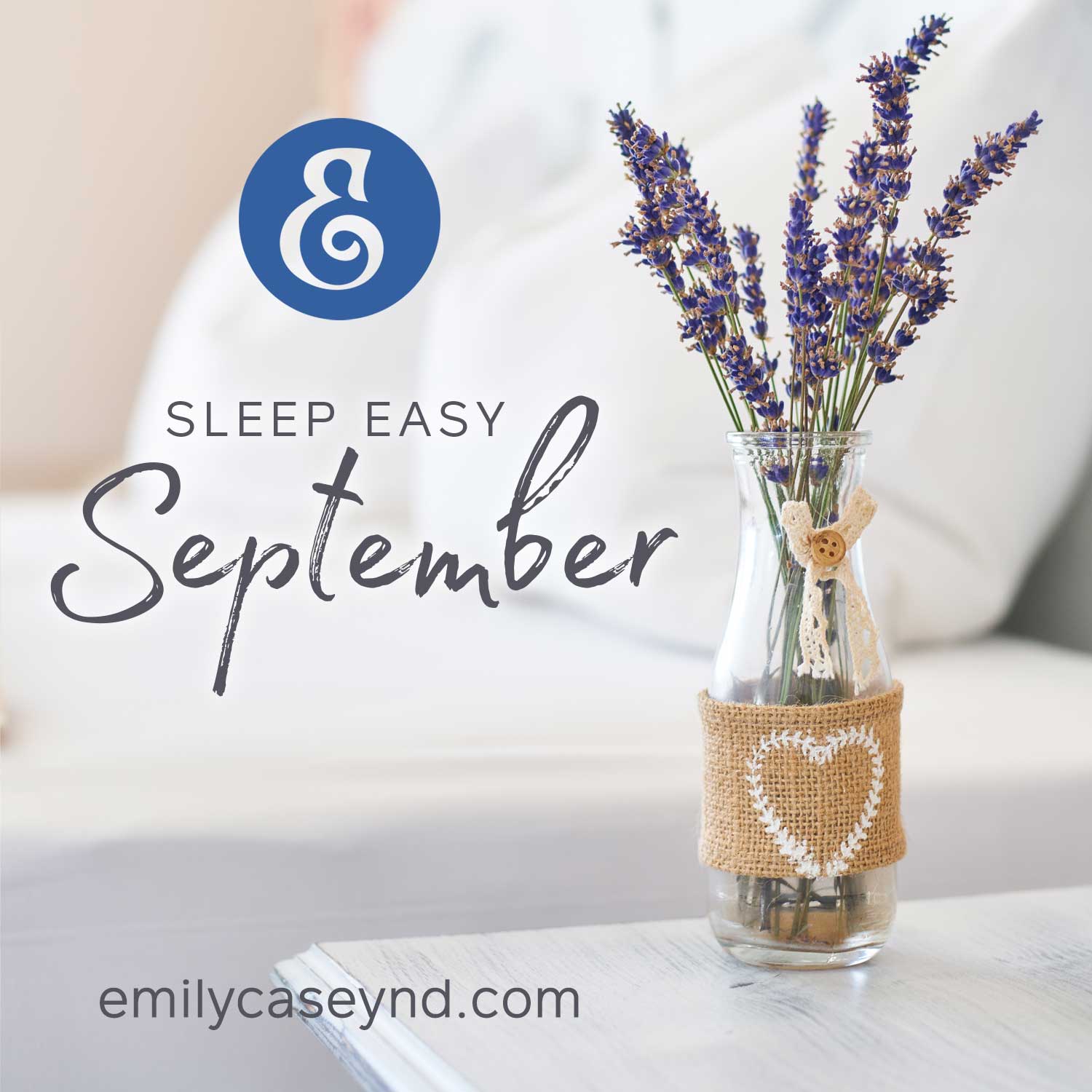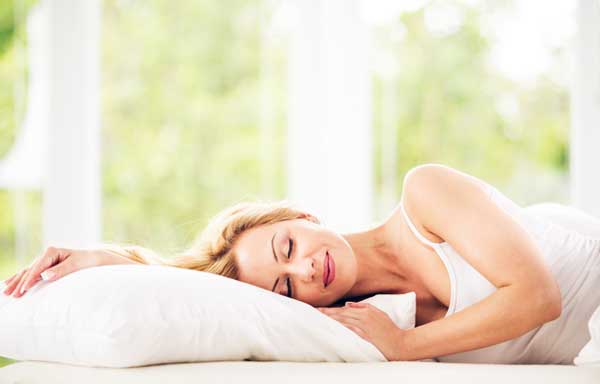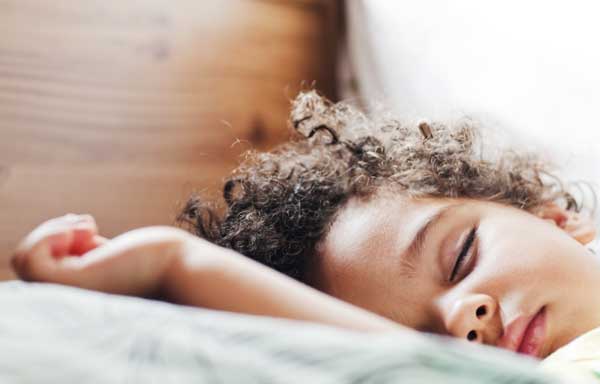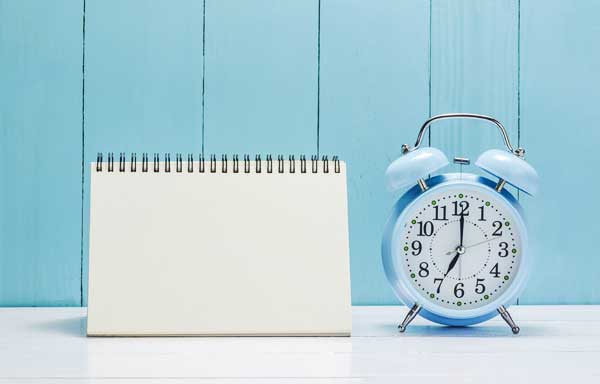01 Sep Sleep Easy September
September can be considered the “Other January”, the beginning of a new year, and a perfect time to set yourself up with good habits. The focus of this blog post is to help you get your sleep back on track. Sleep plays a vital role in your mental health, physical health, and quality of life. The health benefits of getting sufficient sleep are numerous but sleeping well can be quite challenging for a lot of people. Luckily, I have some great tips to help you improve your sleep and your health overall! In this post, we will be discussing the important daytime and nighttime sleep hygiene tips that lead to improvements in both sleep quality and quantity. Read on to ensure you sleep easy this September!

I commonly see a variety of sleep issues in my practice, including trouble falling asleep, staying asleep throughout the night, falling back to sleep after waking, or waking too early. I also work with people who feel like they sleep well but never wake feeling rested in the morning. Even if your chief concern isn’t a specific sleep issue, sleeping well can positively impact so many aspects of your health and often becomes one of our treatment goals! Sleep deficiency is linked to an increased risk of heart disease, kidney disease, high blood pressure, diabetes, and stroke. It also increases your chances of being overweight or obese and can hinder your weight loss goals. Sleep is essential for hormone balance, cognitive function, immune system function, healthy growth and development, and, most importantly, happiness and quality of life. Basically, sleep is a key predictor of long-term health and should be a priority on your journey to wellness!
How Much Sleep Is Necessary? (AKA Sleep Quantity)
You will see slight variations in sleep recommendations depending on the source you use but they are generally listed in ranges and are overall quite similar. The National Sleep Foundation recommends the following times:
- Newborns (0-3 months): 14-17 hours.
- Infants (4-11 months): 12-15 hours.
- Toddlers (1-2 years): 11-14 hours.
- Preschoolers (3-5 years): 10-13 hours.
- School age children (6-13 years): 9-11 hours.
- Teenagers (14-17 years): 8-10 hours.
- Adults (26-64): 7-9 hours.
- Older adults (65+): 7-8 hours.

Are You Having A Good Night’s Sleep? (AKA Sleep Quality)
Compared to sleep quantity, each person might have his or her own opinion on this one. If you’re struggling with insomnia, I highly recommend making a list of what you would consider a good night’s sleep and those will be your goals/markers as you make the changes in your life to improve your sleep. The following guidelines are widely regarded as the essentials for a good night’s sleep and have become the basics that I often strive for with my patients:
- You’re asleep 85% of the time you spend in bed. Try to minimize the use of the bed for other activities.
- You fall asleep in 30 minutes or less.
- You wake up no more than once per night.
- When you wake in the night, you are awake for 20 minutes or less.


Medical Conditions Affecting Sleep
Now that we are on the same page when it comes to sleep quantity and quality, let’s consider some of the medical conditions that might be negatively impacting those sleep parameters. Once you have a better understanding of how your sleep is being affected, you will be more able to make the necessary changes to improve it.
- First and foremost, make sure you always consider medication side effects! Consider talking to your doctor if you think a medication (or a natural health product) might be the culprit.
- Substance abuse. (Did you know that alcohol suppresses your REM sleep?)
- Psychiatric conditions, such as depression, anxiety or bipolar disorder.
- Medical conditions, such as chronic pain, chronic obstructive pulmonary disease, diabetes, or hyperthyroidism.
- Hormonal imbalances, such low progesterone or estrogen, which can commonly be seen during menopause.
- Obstructive Sleep Apnea. If you suspect sleep apnea, make sure you talk to your doctor about proper sleep testing. There is effective treatment for the symptoms of sleep apnea if it is accurately diagnosed.

Medical Conditions Affecting Sleep in Children
Insomnia can absolutely occur in children as well. Possible causes for insomnia in children include stress, use of caffeine or other stimulants (caffeine is found in many sodas), side effects of medications (such as those used for ADHD or depression), and medical conditions such as asthma, allergies causing congestion, thyroid disorders, or restless leg syndrome. Children can also experience obstructive sleep apnea so a sleep study is likely to be recommended if your child suffers from unexplained sleep issues. I also always recommend that parents consider environmental factors, such as noise, temperature, light, and use of electronics in the bedroom. If none of these apply, the sleep hygiene recommendations in this post are all applicable to children as well.

Key Sleep Hormones
Cortisol
Cortisol is produced on a specific curve throughout the day. Our bodies naturally need more cortisol in the morning to transition from being asleep to getting up and moving around. It then slowly declines over the course of the day to be at its lowest levels overnight when we are sleeping. Dysfunctional cortisol production (which can be caused by HPA Axis Dysfunction. See Adrenal Love August to learn more about the HPA Axis) can play a role in sleep issues. Certain factors can lead to HPA axis activation or increased cortisol production at night and they can make it harder to fall asleep or stay asleep. Lifestyle factors that can raise cortisol inappropriately at night are caffeine, vigorous exercise, working/studying, and other stressful tasks.
Melatonin
Melatonin is also produced on a curve throughout the day but it fluctuates in an opposite curve compared to cortisol. Melatonin should be low throughout the day when we are awake and increase at night to put us to sleep. There are many factors that can affect melatonin production.
Most importantly, melatonin is affected by light. Light exposure during the day signals the body to suppress melatonin, while lack of light exposure at night encourages increased production. You can optimize your melatonin cycle by getting outside in natural sunlight during the day and making sure your room is pitch black and free from electronics at night! Electronics produce blue light, which suppresses melatonin and this is why they are especially detrimental when used at night.
Melatonin also loves routine! This helps our bodies know when to start producing melatonin and when to stop. Irregular bedtimes, shift work, and jet leg can all throw off the natural rhythm of melatonin production. These are situations in which you might benefit from additional supplementation.
Sleep Hygiene
Now, let’s look at some of the specific routines you can focus on in your daily lives to improve your sleep! This is called sleep hygiene. When you’re following this advice well, you’re living with good sleep hygiene and improving your chances of having restorative sleep. However, please remember that changing sleep patterns takes commitment. It can be frustrating to try these tips and tricks for a few nights and not see huge improvements right away. You have to give your body time to get used to the new routines and reset the circadian rhythm in a positive way.

Daytime Sleep Hygiene
- Avoid caffeine after 3pm.
- Avoid more than 1-2 servings of alcohol in the evening.
- Exercise earlier in the day (before 8pm).
- Stop working or completely mentally fatiguing tasks by 9pm.
- Avoid long naps. If you need to nap throughout the day, stick to 20 minutes.
- Spend time outside in natural sunlight for at least 20 minutes daily.

Nighttime Sleep Hygiene
- Go to bed at the same time every night (ideally 10-11pm)
- Wake at the same time every morning (ideally 6:30-7:30am).
- Avoid technology/screens 1 hour before bedtime.
- Choose relaxing activities before bed, such as taking a bath, journaling, listening to relaxing music, ore ready.
- Make sure your bedroom is comfortable, pitch-black (even your alarm clock might be producing too much light. Consider an eye mask if this is too challenging), and quiet (consider earplugs if necessary).
- Only go to bed when you feel sleepy and only use your bed for sleep, sex, and relaxing activities. Keep anything that causes worry or stress out of the bedroom! We don’t want our minds to associate the bed with stress.

Additional Naturopathic Support for Sleep
Not sure that sleep hygiene is enough to improve the struggles you’re going through with your sleep? Working with a naturopathic doctor can help you determine the root cause behind your sleep issues and address them with additional support tailored specifically to your needs. Below are some of the possible nutritional and herbal supplements that can be used:
- Melatonin supplementation
- Herbal sedatives or nervines, such as valerian root, skullcap, lavender, chamomile, passionflower, and many more.
- Adrenal support, such as ashwagandha, rhodiola, holy basil, and many more.
- Hormonal support to balance estrogen and progesterone.
- Regulating blood sugar levels through dietary changes, lifestyle adjustments, and nutritional supplementation.

Tracking Your Sleep
Before seeing a healthcare professional to assist you in improving your sleep, it can be beneficial to pay more attention to your sleep so that you can explain exactly what is going on each night. This helps us tailor the treatments to your specific concerns. There are many options for tracking your sleep patterns. You can use the iPhone app called Sleep Cycle, get yourself a FitBit or other tracking device, or use an old fashioned sleep journal and fill it out each day. Try tracking the following variables:
- Time asleep
- Time awake
- Bedtime and wake time
- Number of times you’re waking throughout the time
- Daytime activities that either worsen or improve sleep

